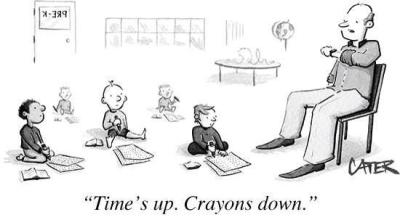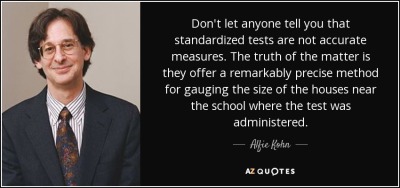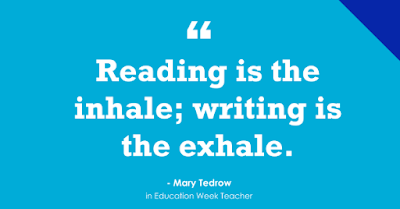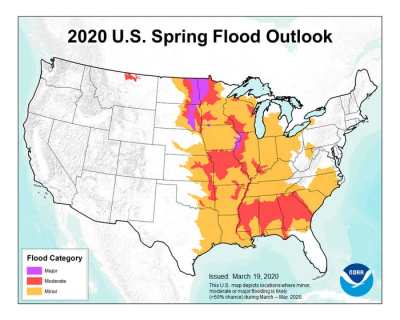Beating Coronavirus Capitalism, Disasters
DUMPING THE TESTS IS A GREAT IDEA
Why Scrapping School Testing This Year Is a Good Idea
Before I retired, I had the difficult task of serving as one of my school’s co-test coordinators. It was my job to count, secure, distribute, secure, package up, secure, and prepare our state’s Big Standardized Test (h/t Curmudgucation) for shipping. Sadly, I have been trained in tests and measurements so I understood why, for so many years, the Big Standardized Tests were being overused and misused.
Now that the overuse and misuse of testing pendulum is, hopefully, swinging the other way, my fervent hope is that perhaps we can limit the damage done by the tests.
In the meantime, this year’s Big Standardized Tests are being canceled. Jersey Jazzman explains why that’s a good idea and in the process, also explains why the tests aren’t so good for students anyway. They are extremely accurate in assessing the economic status of students, but that’s about all.
Start with the obvious: a “standardized” test has to be administered in a standard way. If some students receive the test in different platforms, or in different environments, the test is no longer standardized. Of course, there were already huge differences between students in these factors… but Covid-19 has made things far worse. There’s just no way to even come close to standardizing the conditions for testing in the current environment. Will the students be at home, in school but “social distancing,” in regular school, somewhere else… we just can’t say.
Next, we have always had big differences in students’ opportunity to learn — but now the differences are greater than ever. Again, there are huge variations among students in their access to qualified educators, high-quality facilities, adequate instructional materials, well-designed curricula, and so on. The best use of test results was to make the case that the variation in these things was creating unequal educational opportunities, and that public policy should focus on getting resources where they were needed the most.
But in a quarantine, we now have to add all sorts of other inequalities into the mix: access to broadband, parents who have the ability to oversee students’ instruction, schools’ ability to implement distance learning, etc. Why implement these tests when inequities within the same classroom — let alone between schools — have grown so large?
PUTTING THINGS IN PERSPECTIVE
Dear Teachers: There Are Many Things That No Longer Matter
A pandemic puts things in perspective. The health and safety of our students, and their families, are more important than the tests.
If you are attempting virtual learning with your students, now is the time to teach what you have always recognized are the crucial topics in your curriculum. Throw out the state requirements and embrace your professional decision-making skills. The state requirements do not matter. There will be no formal observations. No one will give you some annual professional performance review (APPR). We have known all along that those measures are bullshit. I am continuing to cover the most important content, but I am also asking my students to act as historians through recording a daily diary of this extraordinary time. This time will shape them forever, and we are their guardians.
TOP 10 THINGS TO DO WHILE SOCIAL DISTANCING
Top 10 Things I Want My Students to do During the Coronavirus Quarantine
Steven Singer, who blogs at Gadfly on the Wall Blog, lets his students know that there are things to do during “social distancing.” The first is to read a book. For those without access to books, there are the library apps Libby and Hoopla to get digital books.
He wisely includes writing, immediately after reading. Reading and writing are reciprocal. “Reading is the inhale; writing is the exhale.”
2) Read a Book
I ask all of my students to have a self-selected book handy for sustained silent reading in class. Hopefully, you brought it home. If not, take a look around the house. Maybe you’ve got a dusty tome hanging out in some corner. Or – hey – if you have Internet access, you probably have the ability to get an ebook.
Read something – anything you want.
It will while away the hours, relax you and maybe get your mind to thinking about things above and beyond how much mac and cheese you’ve got stored in the cupboard.
3) Keep a Journal
Do you realize you’re living through a moment of history? People will look back on this and wonder how people got through it. You could fill in the blanks for some future researcher. Just a description of your everyday activities, what you’re thinking and feeling, your hopes and dreams – all of it has historical value. Plus, you’ll get some practice expressing yourself in writing. And just think – a simple story about how you survived the great toilet paper shortage of 2020 could end up being taught in the classrooms of the future!
Make it a good one!
IT’S ALL ABOUT THE STUDENTS
Our Students Need Us Now More Than Ever
Are you keeping in touch with your students during this extended coronviracation? You should.
If anything, we teachers and support personnel are needed now more than ever.
Close a school for a while and the community instantly feels the effects. Shut them down across the state and everybody has to adjust.
Our students look to us for guidance, direction, assistance, validation, answers, and the ability to use voice. Nothing has changed in that respect.
Educators advocate for students and schools. Nothing has changed in that respect.
We collaborate with each other and remove obstacles for our students. Nothing has changed in that respect.
We will adapt. We will overcome this obstacle. No one adapts to situations and change like we do.
Because it’s all about the students.
BEATING CORONAVIRUS CAPITALISM
Coronavirus Capitalism — and How to Beat It
Last week, in my post, Public Education, Disaster Capitalism, and COVID-19 (expanded into an op-ed in our local paper here), I discussed how “edupreneurs” will be likely to swoop in and take advantage of public education to further their dreams of privatization. I quoted author Naomi Klein from her book, The Shock Doctrine: The Rise of Disaster Capitalism. Today, I saw this post by Ms. Klein talking about the exact same thing.
The COVID-19 disaster is exactly the sort of disaster that disaster capitalists exploit. Klein wrote…
This crisis — like earlier ones — could well be the catalyst to shower aid on the wealthiest interests in society, including those most responsible for our current vulnerabilities, while offering next to nothing to the most workers, wiping out small family savings and shuttering small businesses. But as this video shows, many are already pushing back — and that story hasn’t been written yet.
DISASTER UPON DISASTER
Midwest Girds for Floods While under Corona Lockdown
While we’re worrying about COVID-19, we can’t forget that the Earth is still reacting to human-induced climate change.
As an upsurge in coronavirus infections stretches thin the capacity of health care workers and emergency managers nationwide, the Midwest is bracing for another battle: a potentially devastating flood season.
















